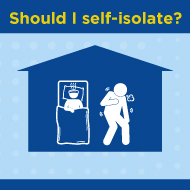Should I self-isolate?

If you live alone and have symptoms of the virus, however mild, stay at home for seven days.
Government advice for COVID-19
The UK government has published 'stay at home guidance' for households with possible COVID-19 infection. This article includes some of the key information from that guidance, the full document can be found at gov.uk.
The UK government has published 'stay at home guidance' for households with possible COVID-19 infection. This article includes some of the key information from that guidance, the full document can be found at gov.uk.
The most common symptoms of COVID-19 are the recent onset of a new continuous cough and/or a high temperature. For most people, COVID-19 will be a mild illness.
The government's key advice is that if you live alone, and you have symptoms of the virus - however mild - you must remain at home for seven days from the date your symptoms begin.
If you live with other people and you are the first in the household to have symptoms of COVID-19, then you should remain at home for seven days, but all other household members who remain well must stay at home and not leave the house for 14 days.
For anyone else in the household who starts displaying symptoms, they need to remain at home for seven days from when the symptoms appeared, regardless of what day they are on in the original 14-day isolation period.
People with COVID-19 symptoms are urged NOT to go to their GP surgery, pharmacy or hospital and do not need to contact the NHS 111 online coronavirus service. If you feel you cannot cope with your symptoms at home, or your symptoms do not get better after seven days, then you are encouraged to call 111.
The government states that testing for COVID-19 is not required if you're staying at home.
To read the full guidance document, please click here.



 The latest
The latest